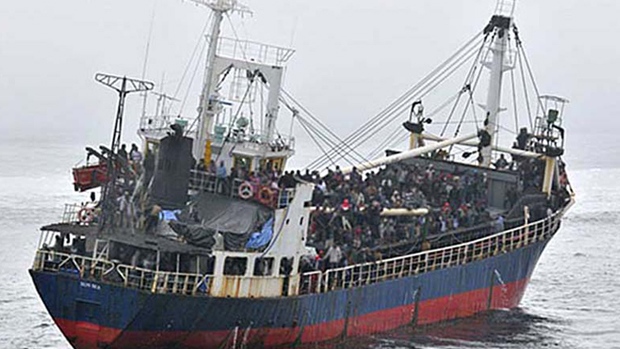
In previous commentaries I’ve written about displacement in Vancouver caused by gentrification in the context of the original displacement of the Musqueam, Squamish and Tsleil-Waututh peoples, the original inhabitants of this land known as Vancouver. Now I want to consider people bought to this land by displacement.
In August 2010, a few short months after Vancouver’s $6 billion Olympic spectacle (the City’s second mega event after Expo 86), 492 Tamil children, women, and men arrived on the coast of British Columbia. Fleeing ethnic persecution and civil war, the migrants boarded the cargo ship MV Sun Sea and began their dangerous 3–month journey. Various state forces intercepted the ship and directed it to Canadian Forces Base Esquimalt on the southern tip of Vancouver Island before incarcerating the migrants at prisons throughout Greater Vancouver.
No One is Illegal-Vancouver (NOII), an anti–colonial migrant justice collective, was active in supporting the refugees, raising awareness of their expected arrival and organizing a demonstration that included poetry to demand that the government let them stay. During the migrants’ incarceration, NOII held regular noise demonstrations outside of the prison walls, projecting poems and songs in Tamil from a loudspeaker system so the refugees know they were welcome. I remember seeing little hands waving to supporters from between the bars of a window, the distance so far you couldn't see skin colour. In the fall, the collective published a chapbook titled r/ally, which begins with a statement of intention to produce history through poetry:
as we highlight continued community resistance against the colonial canadian state and its (in)justice system we will remember the victories we have achieved and celebrate our stories. here, through poetry. with gratitude, this collection is formed from words of our allies.
Contributor Cynthia Dewi Oka, poet, activist and revolutionary mama, was a child when she came to Canada as an Indonesian refugee. Oka’s “490 stay” speaks to the Tamil migrants’ arrival and experience of detainment:
sea anxiety sun premonition children
in smoke kissed teeth singing there is life after
death in uniform how tall your gun freedom
feet levitate in delineated air breath there
electric ribbons decorative foliage buses meeting
scheduled appetites famished & overflowing
hands conditioned to curl tight around
full first world mouths clean water & metal
guarding small pale hearts called citizenship
come terror sewn in our surface open
chest against bulletproof glass numbered
shoulders twisting pale in august burn
blood earn rest (never) return like real
names etched in leaves on forest floor children
tread carefully whispering their sadness
stay for dreamtime blinking on other side
of water & nausea & debt & abeyance
of loved ones pearling in river bottoms
brown desire to live magnificent biological
weapon the nerve to ask for love be met
precious how many boats does it take
How many boats indeed?
The final page of the first edition of r/ally reproduces a NOII poster about the impending arrival of the migrants and features a quote from Vancouver poet and black historian Wayde Compton:
what colour is enough? what language does it speak?
and isn’t that the real issue written between the bordered lines,
the bartered lives in this semantic peanut and shell game?
The quote is from Compton’s “Illegalese: Floodgate Dub” in Performance Bond (Arsenal Pulp Press, 2004). The poem is dedicated to an earlier group of asylum seekers, 600 Chinese migrants from the Fujian province who arrived on the coast of BC in 1999 in four run–down ships:
if you arrive in the belly of a rusting imagination, there are grounds to outlaw you. but Canada is a remix B–side chorus in the globalization loop: a sampled track of “back home”–desiring, “old days”–admiring, democracy dreaming, racism–reaping homesickness that even medicare can’t cure. there is no “fresh off the boat” or the plane or the hope of consistency in foreign and foreigner policy or obduracy of floodgate metaphors and death sentence deportations. the backbeat back–bone of the chorus that screeches “back home!” is the drum and bass treble track alliteration of Koma-Koma-Komagatamaru.
When the Komagata Maru steamship arrived nearly a century ago in May 1914 carrying 376 passengers from India, it was refused entry. All 376 passengers were British subjects, yet only 24 were permitted to stay at a time when the nation admitted thousands of white Europeans. Compton historicizes Canada's shame of turning away ships that carry racialized passengers, connecting past and present:
when jurisdiction cuts the earth to the bone
the proper diction is the unspoken issue, and the flesh
of the people’s colour in the boats in the hull in the belly of a dream
without papers or defination, in quotations, “refugee,” a penstroke
from relief. languishing in the languaged exile of illegalese.
and if it was heroic for runaway slaves to seep into Canada,
why is it villifiable for Chinese migrants to hide in the belly of a dream now?
One of the women aboard the MV Sun Sea was pregnant when she crossed an ocean to get here. Swimming inside the ocean of her mother’s belly inside the hull of a rusty ship, the baby girl was born shortly after arriving in Canada. According to Canadian law, she is not illegal.

Unceded west coast city: Vancouver